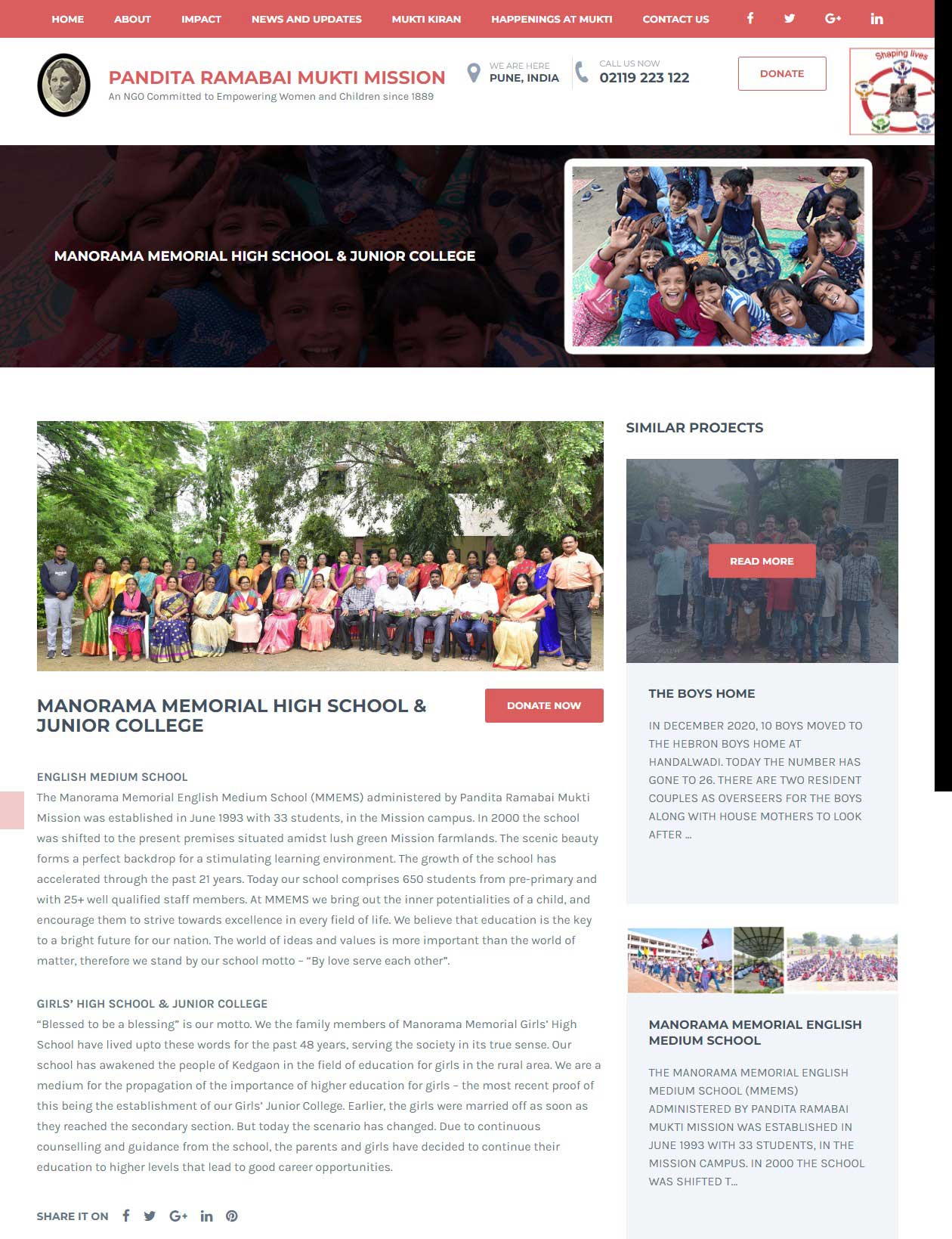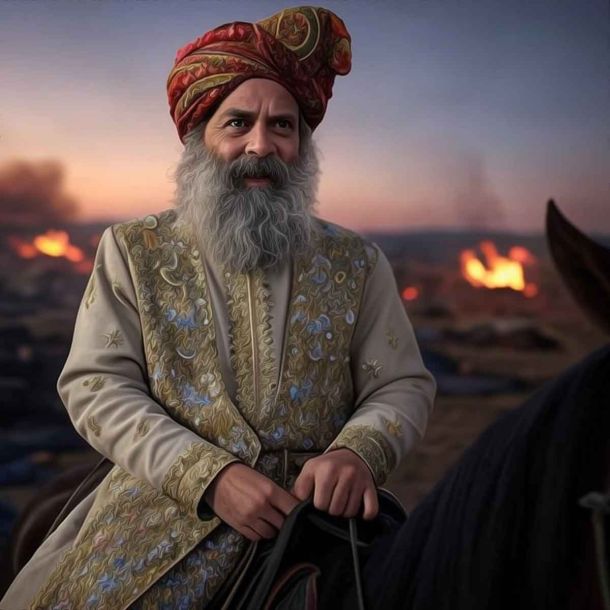MORE COVERAGE
Twitter Coverage
Satyaagrah
Written on
Satyaagrah
Written on
Satyaagrah
Written on
Satyaagrah
Written on
Satyaagrah
Written on
JOIN SATYAAGRAH SOCIAL MEDIA
"Hallelujah Saga": Minor girls in Pune's Pandita Ramabai Mission suffer assault for not embracing Christianity, facing forced prayer, confinement, made to bathe in public and a battle for justice in a shocking case of religious coercion, 4 accused booked

In a distressing incident from Pune, Maharashtra, an alarming case of alleged forced conversion and mistreatment of minors has come to light. According to a report by Satyaagrah recently, two minor girls were reportedly subjected to forced conversion to Christianity at an orphanage in Daund, Pune district. The incident has raised serious concerns about the welfare and rights of children in such institutions.
|
The girls, who were sent to the orphanage following their mother's death in 2020, reportedly faced not just coercion to change their religion but also physical and emotional abuse. They were allegedly compelled to abandon their Hindu faith, including being influenced against Hinduism and Hindu deities. The reports suggest that they were subjected to cleaning toilets as a form of punishment, adding to their ordeal.
Adding to the gravity of the situation, the girls were reportedly assaulted for not praying to Jesus, not attending church, and were even force-fed wine - actions that constitute a severe violation of their rights and freedoms. Such actions, especially against minors, are deeply concerning and reflect a gross abuse of power and responsibility by those in charge of their care.
The Police have responded to these serious allegations by filing an FIR against the Pandita Ramabai Mukti Mission, the orphanage in question, and three of its matrons – Sakshi Bhalerao, Nisha More, and Vaishali Bhasker. They are accused of assaulting, torturing, and forcibly converting the minor girls to Christianity. This legal action signifies the recognition of the severity of the allegations and the need for a thorough investigation to ensure justice for the affected girls.
According to a detailed FIR copy obtained by OpIndia, a distressing case of abuse and forced religious conversion at the Pandita Ramabai Mukti Mission orphanage in Pune has come to light, involving two minor girls. The FIR outlines serious allegations against four individuals, who have been booked under various sections of the Indian Penal Code and the Protection of Children from Sexual Offences Act, 2012. These sections include 354B (Assault or use of criminal force to woman with intent to disrobe), 341 (Punishment for wrongful restraint), 295A (deliberate and malicious intention of outraging religious feelings), and 298. The complaint was filed by one of the maternal aunts of the victims, initiating legal action against the accused.
|
The report highlights that the two girls, aged 9 and 11, were subjected to confinement and mistreatment in the orphanage located in the Daund region of Pune district. The children were reportedly forced to engage in demeaning tasks like cleaning public toilets and were deprived of basic necessities like good food and clothing. Additionally, the girls were compelled to take baths publicly, an act that further undermines their dignity and privacy.
The most concerning aspect of this case is the forced conversion of these minors to Christianity. The authorities at the orphanage allegedly baptized the girls, compelled them to attend church every Sunday, and barred them from wearing any Hindu religious symbols, such as bindis, bangles, or jewelry. The psychological manipulation extended to indoctrinating the girls with the belief that Hindu gods do not exist, promoting the idea that "Hindu Gods are dead. They don’t exist. People only apply haldi kumkum on idols unnecessarily," while asserting that "Jesus is the only existing God."
In a distressing revelation from the complaint filed by the aunt of the two minor girls in the Pandita Ramabai Mukti Mission orphanage case, it has come to light that she faced significant obstacles in her attempts to interact with and care for her nieces. The complaint details that for a period of one and a half years, the aunt was rarely permitted to meet the girls and was not allowed to take them home for vacations. This restriction on family interaction raises serious concerns about the transparency and intentions of the orphanage's administration.
Further complicating the situation, the aunt reported that the orphanage officials refused to release the girls to their family. The reason given for this refusal was financially motivated; the orphanage claimed to be receiving foreign funds for every girl confined there and could not afford to lose the girls due to the financial implications. This shocking admission, if true, suggests a gross exploitation of the children for monetary gain and a blatant disregard for their welfare and familial rights.
The complainant also mentioned that the orphanage authorities tried to reassure the family by claiming that the girls were being well cared for and would be sent abroad for education. However, according to the aunt, these were false assurances meant to placate the family, as she believed they were being deceived. The claim of potential foreign education appears to be a tactic used by the orphanage to justify their retention of the girls and to distract from the reality of their situation.
Aunt said, “However, they kept on trying to convince us that the girls were being taken care of and that they would be sent to foreign countries for education. But we were being cheated.”
 |
How did the two minor girls land in the Pandita Ramabai Mukti Mission?
The story of how the two minor girls ended up at the Pandita Ramabai Mukti Mission in Daund begins in the Shivajinagar area of Pune. After their mother's death, the girls were living with their maternal aunt in the Bhavani Peth area. The girls' relationship with their father was minimal, primarily due to gender biases, as he shared little bond with them because they were girls. “My sister and her husband shared no relation after these two girls were born. She had been staying with our mother in Pune. And after she died in 2021, I took responsibility for her daughters (two victims of this case),” the maternal aunt recounted.
According to information gathered by OpIndia, the girls were students at the Bapusaheb Pawar Prathmik School in Bhavani Peth, where certain NGOs like the Bharatiya Samajseva Kendra were involved in student welfare. In 2021, a significant turn of events occurred when a social worker from one of these NGOs contacted the aunt. This social worker expressed concern that the girls' father would not take adequate care of them and suggested that they would benefit from being placed in a reputable hostel for better education and lifestyle.
Despite initial reluctance from the aunt, the persistent persuasion by the social worker led to the girls being admitted to the Pandita Ramabai Mukti Mission, facilitated through the Bal Kalyan Samiti in Yerwada.
The situation of the two minor girls at the Pandita Ramabai Mukti Mission orphanage turned out to be significantly different from what their aunt had been led to believe. Initially, she was informed that the girls would be staying in a hostel. However, in a deceptive move, they were instead kept at the orphanage and confined for nearly two years. During this time, the girls were reportedly isolated from their family, as they were not permitted to meet their aunt or communicate with her openly. This restriction on their communication and interaction with family members raises serious concerns about their welfare and the intentions of the orphanage authorities.
What happened to the girls in the orphanage; force-fed ‘wine, bread ‘grape juice’, bread
The ordeal of the girls at the orphanage, as recounted to the police, paints a harrowing picture of neglect and mistreatment. They alleged that they were subjected to torture and deprived of essential needs such as proper clothing, food, and other basic necessities. This neglect constitutes a gross violation of their rights and a betrayal of the trust placed in the orphanage by their family.
Furthermore, the girls revealed that they were forced to perform menial and degrading tasks, such as cleaning public toilets and washing vessels at the orphanage. Such treatment is not only humiliating but also indicative of an exploitative and abusive environment.
As detailed in the FIR, the two minor girls at the Pandita Ramabai Mukti Mission orphanage faced a series of deeply troubling experiences and mistreatment:
Food and Drink: The girls were made to eat white bread and drink grape juice, which they believed was red wine. This act could be seen as part of the forced religious conversion process, deviating from their traditional dietary practices.
Religious Coercion: The girls were reportedly barred from praying to Hindu deities and were indoctrinated to believe that "Jesus is the only existent God and all Hindu Gods and Goddesses are dead." This indoctrination represents a severe violation of their religious freedoms and rights.
Forced Conversion: The girls were baptized and forcefully converted to Christianity, which is a clear infringement on their right to choose and practice their religion.
Mandatory Church Attendance: They were compelled to attend Sunday church services and recite Christian prayers. Non-compliance resulted in being denied proper food, adding an element of coercion to their religious practice.
Violation of Privacy: In a disturbing violation of their privacy and dignity, the girls were forced to bathe openly in public.
Health Hazards: The girls reportedly suffered infections in their fingers due to being forced to clean toilets using harsh chemicals and acids, indicating neglect and endangerment of their health.
Physical Abuse: The FIR mentions frequent torture, assault, and beatings by the Matron Nisha More and Vaishali Bhasker, pointing to a pattern of physical abuse.
Caste-based Abuse: The girls faced abuse over their low caste, highlighting the issue of caste discrimination within the orphanage.
Humiliation Tactics: They were given strange, shapeless haircuts, made to wear torn clothes, and photographed in this state, which seems to be a deliberate tactic to humiliate them.
Cultural Prohibition: The minors were barred from wearing traditional Hindu symbols like bindi and bangles, further stripping them of their cultural identity.
Confinement as Punishment: Matron Sakshi Bhalerao reportedly confined the girls in the bathroom for hours as a form of punishment for not following orders.
The orphanage receives foreign funds for every child confined
In a significant development on May 3, 2023, the father of the girls involved in the Pandita Ramabai Mukti Mission case took a step to regain custody of his children. He submitted a letter to the orphanage expressing his ability and desire to care for his daughters. However, his request was met with a stark refusal from Nisha More at the orphanage. More explicitly stated that the girls now belonged to the orphanage, saying, “the father now had no relation with the girls.”
Further complicating the issue, Nisha More informed the father that the orphanage was financially incentivized to keep the girls. She explained that “the orphanage received specific amounts from foreign countries behind every child in the orphanage” and that they would not forfeit the girls due to this financial arrangement. This revelation points to a potential conflict of interest where the welfare of the children might be secondary to financial gain.
The girls' aunt, upon learning about the orphanage's response, was deeply troubled. In her attempt to gain custody of the girls, she approached the Bal Kalyan Samiti for assistance. Unfortunately, the response she received from the authorities at the Samiti, including Wasim Sheikh and other officials, was disheartening and discriminatory. They allegedly dismissed her concerns with caste-related insults, reportedly saying, “You low-caste, illiterate people will never change.”
About Pandita Ramabai Mukti Mission
The Pandita Ramabai Mukti Mission, established in 1889 in Kedgaon, Daund, has a long-standing history of service. It presents itself as a compassionate organization on its website, claiming to be “committed to the empowerment of destitute women and children since 1889”. It describes itself as a Christ-centered home focused on caring for, transforming, and empowering women and children from various backgrounds.
The mission's vision emphasizes a spirit-led approach to support and development, as stated on its website: “We seek, in the Spirit of Christ, to sow seeds of change in the lives of every individual under the care of Mukti Mission, skillfully counselling them to deal with the issues of life, initiating varied opportunities of healing and shaping them prayerfully as models of God’s kingdom for the society at large.”
However, given the recent allegations against the Pandita Ramabai Mukti Mission, there is a stark contrast between its stated objectives and the experiences reported by the girls. These accusations underline the need for transparency and ethical practices in organizations that claim to serve vulnerable communities.
The Pandita Ramabai Mukti Mission operates based on specific Biblical teachings. The foundation of its philosophy and work is drawn from Isaiah 61: 1 & 4 of the Bible, which emphasizes compassion and aid to those in need. This passage states: “The spirit of the Sovereign Lord is on me, because the lord has anointed me to proclaim good news to the poor. He has sent me to bind up the brokenhearted, to proclaim freedom for the captives and release from darkness for the prisoners.” These verses highlight themes of providing relief and liberation to the disadvantaged and distressed, forming the ideological backbone of the Mission's activities.
However, in the case of the two minor girls, there is a stark contradiction between the Mission’s stated values and their alleged actions. Reports suggest that these girls were forcefully converted by the Missionary, which goes against the ethos of providing 'freedom for the captives' as mentioned in their guiding biblical verse. This forced conversion raises serious ethical and legal questions about the Mission's practices and respect for individual rights and religious freedoms.
NCPCR Demanded Action Based on a Complaint by IHRC
The plight of the two minor girls came to light when one of their aunts connected with the Indian Human Rights Council (IHRC) and local Hindu organizations in Pune. These groups helped bring the case to the attention of the National Commission for Protection of Child Rights (NCPCR), a statutory body tasked with safeguarding children's rights in India. The NCPCR, upon receiving the complaint, issued a notice demanding severe action in this case.
One notable observation made by the Commission was that the details of the two minors had not been uploaded on the Commission’s Bal Swaraj Portal- Covid Care. The significance of this portal is to monitor the welfare of children affected by the COVID-19 pandemic, especially those who lost their parents to the disease. Given that the minors' mother died under the suspicion of COVID-19, the omission of their details on the portal points to a possible negligence in following due protocols by the orphanage.
The resolution of the case involving the two minor girls at the Pandita Ramabai Mukti Mission came to a head on November 11, 2023. After enduring a prolonged period of confinement and alleged mistreatment, the girls were finally released from the orphanage. They were safely handed over to their aunts, with local Hindu organizations playing a key role in facilitating this transfer. This release marked a significant moment in the case, bringing some relief to the girls and their family after the ordeal they reportedly experienced at the Mission.
A formal complaint has been lodged against the Pandita Ramabai Mukti Mission and its three matrons, identified as Sakshi Bhalerao, Nisha More, and Vaishali Bhasker. They are accused of assaulting and torturing the minor girls and forcibly converting them to Christianity. The gravity of these allegations is reflected in the charges brought against the accused, which include sections 354B (Assault or use of criminal force to woman with intent to disrobe), 341 (Punishment for wrongful restraint), 295A (Whoever, with deliberate and malicious intention of outraging the religious feelings of any class), and 298 of the Indian Penal Code. Additionally, they have been charged under sections 11 and 12 of the Protection of Children from Sexual Offences Act, 2012. These charges were filed based on the complaint registered by one of the maternal aunts of the victims.
The booking of the accused under these sections signifies the serious nature of the crimes they are alleged to have committed. It highlights the importance of the legal process in addressing such severe violations and ensuring that justice is served. The involvement of various organizations and authorities in this case demonstrates the critical role of vigilance and advocacy in protecting the rights and welfare of children, especially those in institutional care.
 |
 Support Us
Support Us
Satyagraha was born from the heart of our land, with an undying aim to unveil the true essence of Bharat. It seeks to illuminate the hidden tales of our valiant freedom fighters and the rich chronicles that haven't yet sung their complete melody in the mainstream.
While platforms like NDTV and 'The Wire' effortlessly garner funds under the banner of safeguarding democracy, we at Satyagraha walk a different path. Our strength and resonance come from you. In this journey to weave a stronger Bharat, every little contribution amplifies our voice. Let's come together, contribute as you can, and champion the true spirit of our nation.
 |  |  |
| ICICI Bank of Satyaagrah | Razorpay Bank of Satyaagrah | PayPal Bank of Satyaagrah - For International Payments |
If all above doesn't work, then try the LINK below:
Please share the article on other platforms
DISCLAIMER: The author is solely responsible for the views expressed in this article. The author carries the responsibility for citing and/or licensing of images utilized within the text. The website also frequently uses non-commercial images for representational purposes only in line with the article. We are not responsible for the authenticity of such images. If some images have a copyright issue, we request the person/entity to contact us at This email address is being protected from spambots. You need JavaScript enabled to view it. and we will take the necessary actions to resolve the issue.
Related Articles
- ‘Hostel’ where Lavanya committed suicide is found to be Vatican funded orphanage with an expired licence in NCPCR investigation: Tamil Nadu
- How millennia-old diverse, polytheistic, ‘pagan’ Greco-Roman civilisation gave birth to an intolerant Christian-majority one: a lesson for Hindus
- Ban this book "Hindu View of Christianity and Islam" by Ram Swarup - Freedom of Expression
- "Justice silenced breeds violence": While the US nudges Pakistan to probe church attacks in Faisalabad, the 'Riyasat e Medina' seems too busy juggling a crumbled economy and appeasing medieval mob passions. Modern times, but medieval priorities, perhaps?
- Christian teacher asked the students to recite Christian prayers while she abused Hindu deities, ‘Bhagwat Gita is evil, read Bible’: Tailoring teacher in Tamil Nadu forces students to follow Christianity, suspended
- Christian evangelists threatens Tamil Nadu RSS worker Ganesh Babu with bogus charges under SC/ST Act for complaining against religious conversions
- Two Christian teachers from two different Govt-aided Christian schools were arrested in Tamil Nadu for sexually abusing minor children: Children as young as ten years old were preyed on by the Head Master, booked under POCSO
- Christian family of nine members revert to Hinduism in Jannapur’s Rama Bhajan Mandir in Karnataka: Shubh Gharwapsi
- Supreme Court agreed to hear a case of an Evangelist and founder of Global Peace Initiative KA Paul - Centre had refused to renew FCRA registration of various NGOs who failed to justify their donations
- 23 Jan to 29 Jan - 2022 - Hindus under attack: Bulletin roundup of persecution, discrimination, and hate crimes against Hindus
- ‘Breast Tax’ to cover their breasts: A False Story to Attack Hindus based on a pseudo-historical legend
- Saint Teresa, who was no saint: The dark side of not so pious history of Mother Teresa
- How order of Supreme Court Allowing Non-Hindus To Own Shops In Hindu Institutions can be challenged
- "In law, not all authorities are 'public'": In a twist that could inspire satirists everywhere, the Bombay High Court clarifies that the Archbishop of Goa isn't under RTI, apparently, divine decrees are no match for bureaucratic ones in the court of law!
- Madras High Court on Monday transferred the Lavanya suicide case to the Central Bureau of Investigation after the victim’s parents filed a petition seeking a CBI probe



























